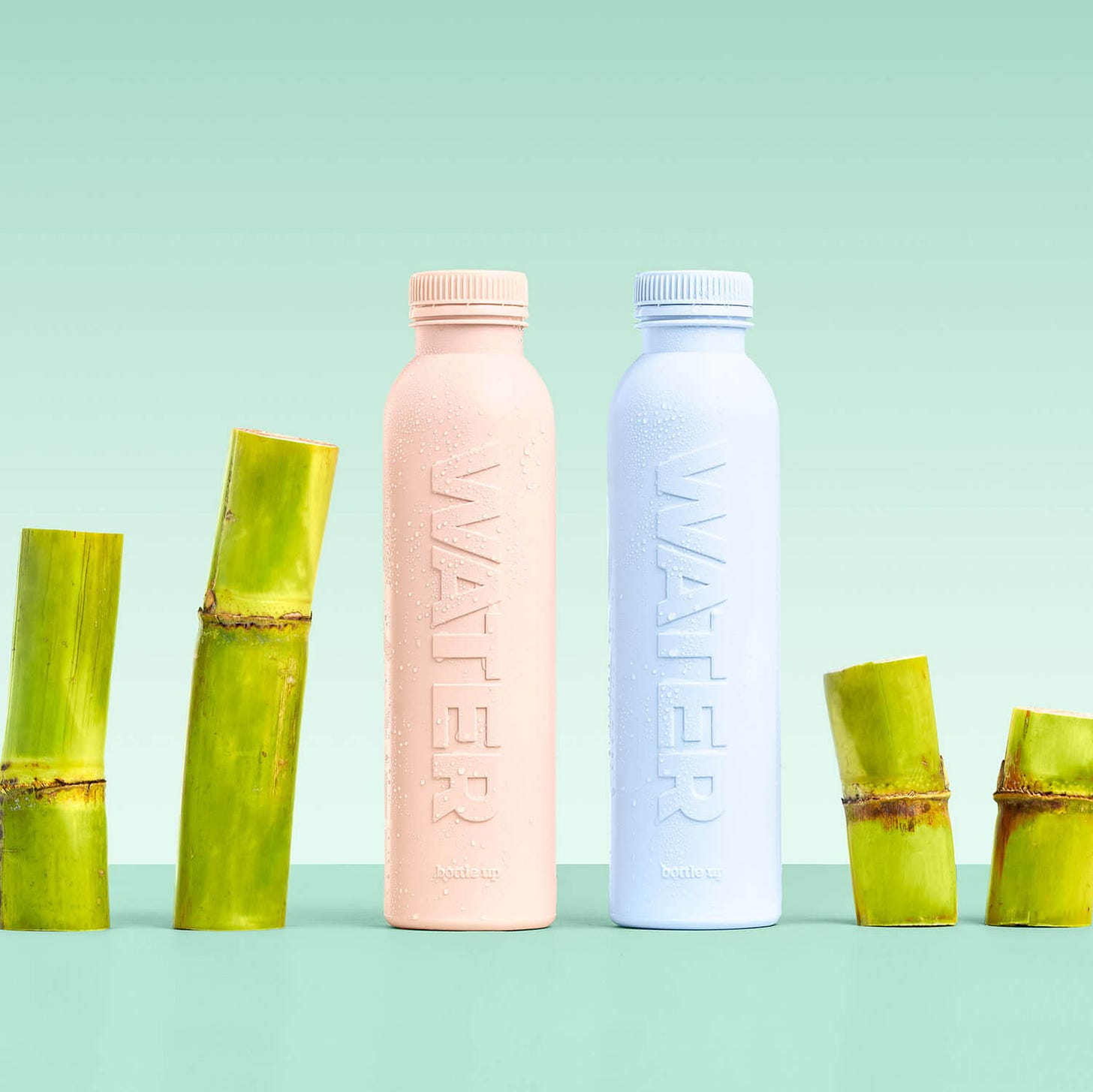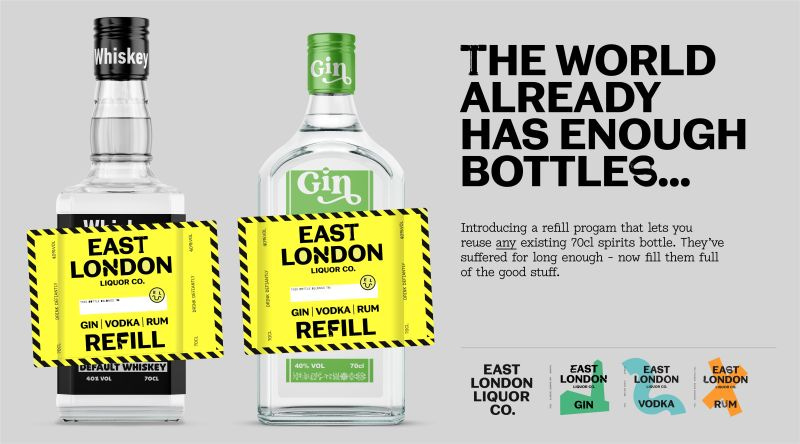🌱 Plastic Overshoot Day, and how BottleUp have swapped single use for sugarcane.
Featuring Bruichladdich Distillery, Arla, Le Labo, East London Liquor Company and more...
Happy Monday!
This week we cover:
Quick Take: Plastic Overshoot Day 2023: Let’s take a closer look at Earth Action’s report.
Brand Spotlight: ‘Think global, drink local’, the mastermind motto of BottleUp
In case you missed it: 🌱 Getting in the Circular Spirit: The UK Plastics Pact and East London Liquor Co's 'Project Refill', featuring East London Liquor Company, Abel & Cole, Ella's Kitchen and more...
> Good News Last Week
🎯 Dr. Bronner's launched their new soap refill cartons which use 82% less plastic than their plastic bottles. Their multi-purpose soap can be used for washing clothes and dishes, as a hand soap, and multipurpose cleaner.
🎯 Bruichladdich Distillery Company Ltd. launched their new Classic Laddie packaging which is 65% lower in emissions than their previous bottle. Reducing their emissions included increasing the recycled glass content to 60%, making the bottle 32% lighter, and optimizing the design to increase the number of bottles per pallet transported.
🎯 Willicroft announced the development Europe’s first plant-based butter made with precise fermentation which produces butyric acid, the same acid present in butter. The product has been in development for two years with funding from Provincie Noord-Holland and will launch in Q4 of 2023.
🎯 H!P Chocolate announced they are B Corp UK certified.
⭐️ Ocado have partnered with Polytag Limited and Bower to launch a digital deposit return scheme. Customers can now receive money back when recycling any own-brand milk bottles by scanning the QR code on the bottle. They will receive 20p cash back which can then be withdrawn to their bank account.
⭐️ Inditex announced their target to halve their supply chain emissions by 2030. With this target none of their suppliers or manufacturers will be allowed to use coal from 2030 onwards.
⭐️ Patagonia launched their Worn Wear online repair portal where customers can request repairs directly and track the status of their repairs. Additionally, they are expanding their fixers in Europe and increasing in-store repair services.
⚡ Greyparrot have developed a new AI system that can be used to analyse waste processing at recycling facilities, creating a better understanding of how materials are being processed. A goal is for this information to influence future packaging designs.
> Click on each link to read more.
> Quick Take
Plastic Overshoot Day 2023: Let’s take a closer look at Earth Action’s report.
July is plastic-free-focused; but this week makes it even more important. On 28 July, the amount of plastic waste generated this year will exceed the world’s capacity to manage it. Managing it means incineration and recycling; and beyond this date, all plastic wastes are going to landfill and to the oceans!
Earth Action, a Swiss-based research consultancy, presented these findings in the 2023’s ‘Plastic Overshoot Day’ report. The report focuses on short life plastic waste from solid waste management systems, including plastic packaging and single-use plastics. The accounting data for the report are taken from PLASTEAX: sustainability experts with a plastic waste management database at the country and polymer-specific level.
Let’s take a look at what they found…
Each country has their own overshoot date each year, determined by their own plastic waste generation and their waste management capacity. For example, the UK’s overshoot day will happen on 17th November, in the same month as Poland. However, there are countries whose overshoot day happens very early in the year, such as Nigeria and Indonesia, falling on 3rd and 6th January respectively.

A later overshoot day is not necessarily better, though. The report found that people in Iceland (31st December) have a yearly plastic consumption of 128.9kg per person, about 50 times higher than Bangladesh’s 2.59 kg (6th January). To better reflect international waste dynamics, Earth Action established 10 country archetypes with recommendations based on plastic usage levels, waste management infrastructure and relevant policies.
Some examples of the archetypes are:
The Transactors: Countries like Australia, Finland and the UK, with high rates of plastic consumption, well-managed waste, and lots of export-import activities.
The Strugglers: Countries like Cuba, Iraq and Qatar, with medium to high plastic consumption that export little of their waste to other countries and face significant management challenges.
The Waste Sponges: Countries like Bulgaria, Peru and Turkey, with low plastic consumption but high levels of pollution because they receive other countries’ waste.
Recommendations and inspiration:
The report recommends strategies such as implementing robust waste management policies, enhancing local waste infrastructure and stopping the import of plastic waste. The two other key recommendations are to reduce plastic production/use and become circular. This is something that YOUR brand can do, by opting for an alternative material or redesign of your packaging and system to become more circular. Some inspirations:
Use alternative materials: Arla Foods are switching to a fibre-based cap and cardboard for their milk cartons and West~Bourne use sustainably sourced wood cellulose and bio-based resins for their resealable pouches (in our latest newsletter). We’ll also be digging into how BottleUp are using sugarcane later in this newsletter too. Supermarkets and food delivery services can play their part by replacing plastic trays with cardboard like Sainsbury’s and Abel & Cole.
Redesign for circularity: Brands are encouraging packaging re-use to eliminate single-use plastics, with solutions like Le Labo and Beauty Kitchen’s return and refill systems. East London Liquor Company has Project Refill, allowing consumers to reuse any of their own spirits bottles. Or, brands are making products that by nature don’t require plastic packaging like EarthKind’s shampoo and conditioner bars.
There are so many exciting opportunities for innovation. If you have made a change in your business for the better, reply and share it with us! You can also read the full report, including all 10 country archetypes and country matrix details here.
> Brand Spotlight
‘Think global, drink local’, the mastermind motto of BottleUp
Reducing single use plastics is far from a simple mission, as we’ve seen plenty of times throughout Plastic Free July and beyond. However, that’s not stopping BottleUp, who are taking an innovative approach to manufacturing and local sourcing and are becoming a staple on shelves all over Europe as a result. BottleUp likes to keep things simple, so in their own words: ‘The bottle’s made from sugarcane, the water’s made from water’. However, like every great brand, there’s much more to BottleUp than that. With an LCA completed by Sustainalize in their back pocket, there’s a lot this bottled water brand is doing behind the scenes to leave a positive impact. Let’s take a closer look:
Keeping it sweet:
Every BottleUp bottle is made from sugarcane. Not simply tasty, sugarcane is also famously clever - it typically only needs to be replanted once every six years, creates its own fertiliser and (like all plants) sequesters carbon from the atmosphere as it grows.
How have BottleUp created this bottle? By utilising I’m green™ plastic, the ‘world's first bio-based plastic produced on an industrial scale’. Created in 2010 at Braskem's Innovation & Technology Center in Brazil, I’m green™ plastic is made from ethanol sugarcane and directly replaces fossil fuel-based feedstock. As Brazil has heavy rainfall, little artificial irrigation is needed for the sugarcane itself as it grows. What’s even more exciting is that the bio-based plastic can be ‘dropped in’ - meaning that it don’t require new machinery or equipment to manufacture the bottles. This makes it much easier for BottleUp’s UK-based producers to use sugarcane as feedstock, which arrives in pellet format once it’s been processed in Brazil.
Like everything, there are downsides to the growing use of sugarcane (whether for bio plastics or other products). For one, it’s incredibly land intensive - WWF reports that sugarcane covers 65 million acres of land around the world, and as a result a dozen countries use at least 25% of their farmland to grow it. One of the biggest producers is Brazil, where BottleUp get their sugarcane from, but they’ve assured their consumers that it is responsibly sourced and not linked to deforestation.
There are other benefits of staying away from fossil-fuels as feedstocks - for example, it’s much easier to create BPA free products. BPA (Bisphenol A) is a chemical commonly found in many plastics, and it’s linked to various nasty health concerns. BottleUP ensure their products are BPA free, prioritising both the wellbeing of people and planet.
Going beyond their own bottles
What’s the next crucial ingredient for bottled water, beyond bottles? Water! BottleUp are committed to sourcing water local to where that bottle is sold - reducing their transport emissions in the process. They don’t stop there. For every bottle sold, BottleUp also contributes 100 litres of safe drinking water to people in less economically developed countries, via their partners Made Blue. To date, they’ve donated over 47 million litres of water!
An innovative alternative to a (literally) flooded market of bottled water, BottleUp have made it easier than ever (and just as cost effective) to swap single-use for sugarcane - a swap that we’ve loved making again and again.
Take a closer look at BottleUp:

> In case you missed it
🌱 Getting in the Circular Spirit: The UK Plastics Pact and East London Liquor Co's 'Project Refill'.
Featuring East London Liquor Company, Abel & Cole, Ella's Kitchen and more...
> Follow up with…
Article: Credibility through accountability: setting the standard
Event: Introduction to B Corp (25th July)
Conference: GreenBiz Net Zero (7th September, Online)
👉 Pssst - want to be featured in our ‘Meet the Partners’ series? Reach out here!


